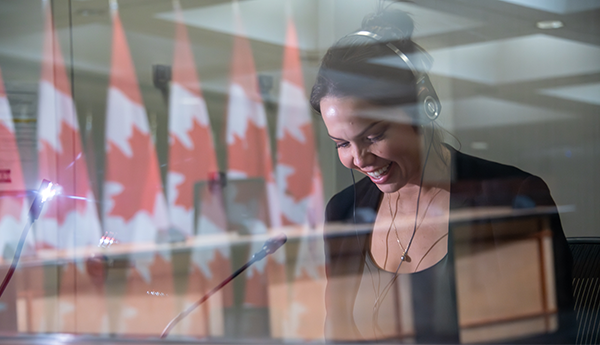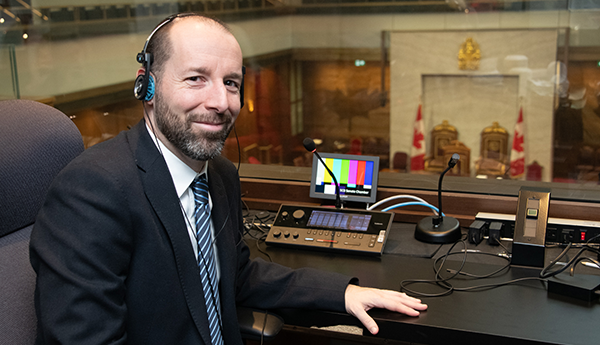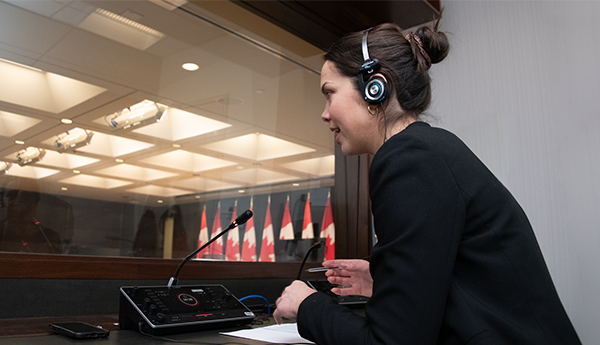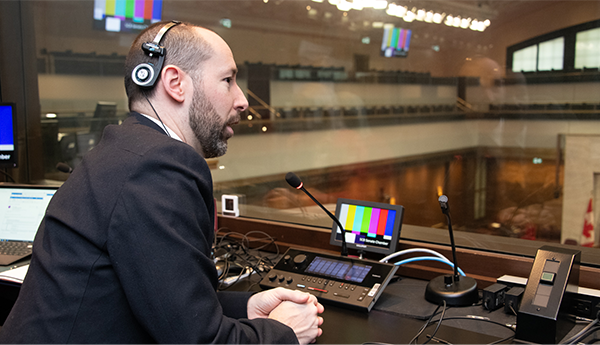Conference interpreters: Athletes of communication
If translation is one of the most ancient professions, conference interpreters are probably its most visible figures. We see them in the corridors of power in every part of the world, including the Canadian Parliament where, this year, we are celebrating 65 years since the introduction of simultaneous interpretation in January 1959.
What is conference interpreting? It's the art of orally re-expressing in another language what a person is saying. As their title suggests, conference interpreters work mainly in the context of large meetings. At the Translation Bureau within Public Services and Procurement Canada (PSPC), they provide interpretation services for parliamentary debates, Supreme Court hearings and visits by foreign diplomats, among other events.
A fascinating profession, conference interpreting attracts people from all walks of life who share an incredible talent for languages (mainly English and French in Canada), as well as being naturally curious, resourceful and open-minded. The mental gymnastics required to listen in one language and speak at the same time in another is a true elite sport. Concentration, preparation and discipline: conference interpreters are communications athletes!
Katiana Pocklington and Hugues Beaudoin-Dumouchel are 2 such athletes in the Translation Bureau. Their very different backgrounds have led them to work as conference interpreters for 4 and 10 years, respectively.
The call of interpretation
Pocklington owes her vocation to the advice of a friend. "He pointed out that I had the necessary skills: I'm bilingual and I'm good at communicating. So I thought, why not? It's a job you learn," explains Pocklington, who grew up in France and New Zealand.

As for Beaudoin-Dumouchel, he was inspired by an interpreter who heard him lead a guided tour. "I was a guide on Parliament Hill, and she said to me: you're bilingual, I could see you being an interpreter!"
Beaudoin-Dumouchel pondered the idea. After several years as a supervisor of parliamentary guides, he felt he'd come full circle. Since he already held a degree in communications and theatre from the University of Ottawa, he took a few translation courses there and then enrolled in a master's program in conference interpreting.

On her part, Pocklington began her master's degree in conference interpreting in Paris. But after 1 year, she moved to Toronto, Ontario. "I was able to go straight into my second year at Glendon [York University] in interpretation, as I had already completed my first year," she explains.
Most universities offer a 2-year master's degree in conference interpreting, although the University of Ottawa offers a 1-year program. York University and the University of Ottawa are the only 2 institutions that offer the program in Canada.
The importance of the message
Pocklington and Beaudoin-Dumouchel agree that their aptitude for communication helps them in their day-to-day work. "My goal is to enable the person listening to me to understand what's going on just as well as the person listening to the original speech," says Beaudoin-Dumouchel. Pocklington adds: "I realized that the most important thing was really the message."
There are 2 main modes of interpreting. One is consecutive interpreting, where the interpreter waits until the speaker has finished before summarizing in the other language. In simultaneous interpreting, the interpretation takes place at the same time as the original speech.
Although consecutive interpreting is a little easier because, as Beaudoin-Dumouchel explains, "you have a little more time to think," simultaneous interpreting is generally the form used in Parliament. A certain leniency is therefore a must, as interpreters need to quickly choose the right expression, the right word and the right level of language and, above all, not second-guess themselves.
Pocklington compares herself to a duck: "I'm calm on the surface, but my legs keep moving underwater," she jokes. "If you stop for even 2 seconds and say to yourself, 'I could use that word instead of another,' you've just missed 3 ideas in the speech," she points out. Beaudoin-Dumouchel adds: "One of the challenges is to move on to the next sentence. What's more, you have to make sure you use references that everyone understands, good punctuation and the appropriate tone."

Unforgettable moments
Despite the demands of the job, the passion of the 2 interpreters is contagious. Beaudoin-Dumouchel claims to have had his most memorable experiences during the last 2 leadership debates. "It takes a lot of preparation. Each party leader has an interpreter for the whole debate," explains the man who provided interpretation services for Justin Trudeau and Erin O'Toole. "We have to be ready to react at any moment, whether it's during the introductory speech or a question. People listening to us have to feel like they're actually hearing the debate."

Pocklington has treasured memories of her first experience of simultaneous interpretation, as a student volunteer at the World Social Forum in Montreal, Quebec. "An activist was talking about her daily life and challenges. It was very moving. I had tears in my eyes. She was so animated, which made my job easier." It was then that Pocklington understood that interpreting requires a balance of empathy and detachment. "And that's when I said to myself: this is what I want to do in life."
The profession of conference interpreter may seem demanding at first glance, but Pocklington really enjoys its dynamic side. "I learn something new every day. The days are never the same, and neither are the hours," she insists with a smile.
Pocklington and Beaudoin-Dumouchel encourage anyone who enjoys communicating to consider a career as a conference interpreter. "If you like people, communications, politics, travel and intellectual challenges, this could be the job for you!"
To find out more about PSPC's employees, projects and services, read other articles found on Our stories.